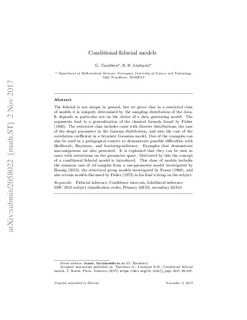Conditional fiducial models
Journal article, Peer reviewed
Accepted version
Permanent lenke
http://hdl.handle.net/11250/2464198Utgivelsesdato
2017Metadata
Vis full innførselSamlinger
- Institutt for matematiske fag [2468]
- Publikasjoner fra CRIStin - NTNU [38127]
Originalversjon
10.1016/j.jspi.2017.09.007Sammendrag
The fiducial is not unique in general, but we prove that in a restricted class of models it is uniquely determined by the sampling distribution of the data. It depends in particular not on the choice of a data generating model. The arguments lead to a generalization of the classical formula found by Fisher (1930). The restricted class includes cases with discrete distributions, the case of the shape parameter in the Gamma distribution, and also the case of the correlation coefficient in a bivariate Gaussian model. One of the examples can also be used in a pedagogical context to demonstrate possible difficulties with likelihood-, Bayesian-, and bootstrap-inference. Examples that demonstrate non-uniqueness are also presented. It is explained that they can be seen as cases with restrictions on the parameter space. Motivated by this the concept of a conditional fiducial model is introduced. This class of models includes the common case of iid samples from a one-parameter model investigated by Hannig (2013), the structural group models investigated by Fraser (1968), and also certain models discussed by Fisher (1973) in his final writing on the subject.

